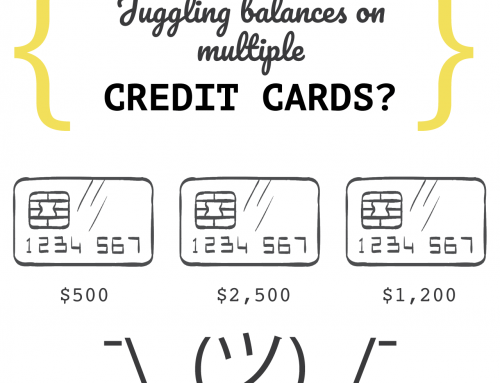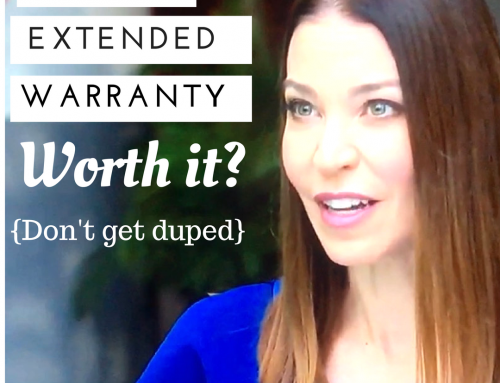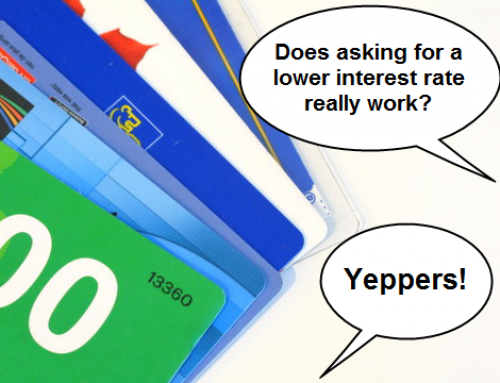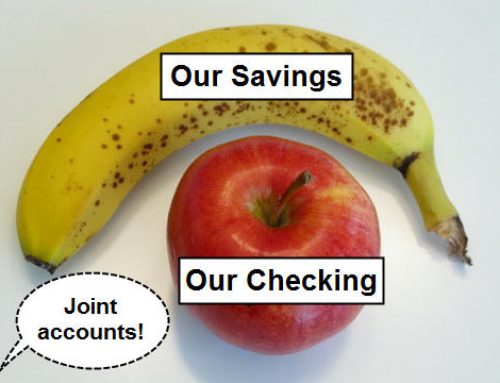Credit card balance protection insurance isn’t worth it. “It’s fantastic for the banker but horrible for consumers.” — that’s what I told CBC’s The National when they asked my thoughts on the product. I didn’t hold back.
Credit card balance insurance is rarely sought out by consumers, but sold by banks claiming it “can help pay down your balance faster and can help maintain your credit rating” if you get sick or lose your job.
If I could have called BULL$HIT on a CBC television, I would have. Instead, I went on air and explained (in polite Canuck fashion) why you should avoid credit card balance protection insurance and how to protect yourself instead.
Here’s my interview with CBC Go Public’s Erica Johnson which aired on CBC’s The National.
1. Balance protection insurance is a VERY expensive policy
I read through a few credit card balance protection insurance policies and found some similar costs. For starters, the premium is calculated as a percentage of your balance owing, charged monthly.

Cost of Balance Protection Insurance
Let’s say your insurance premium is $1.19 per $100 of balance. On a $2,000 balance you’re paying an additional $23.80 per month for balance protection insurance.
This added monthly fee turns a 19.99% annual interest rate to the equivalent of nearly 35%. What kind of robbery is a THIRTY FIVE PERFECT annual interest rate on a credit card? It’s highway all the way.
2. Are you charged if you pay off the monthly balance?
Yes. In order to not get charged the monthly balance protection insurance premium, your credit card statement must have a $0 balance when you receive it. This means you’ve gotta pay off your entire balance BEFORE the statement is even created.
WHO DOES THIS?!?
The problem is many bankers and sales agents push this product when you sign up for a credit card and say you won’t get charged if the balance is zero. That’s technically true, but there is likely a huge misunderstanding what zero balance means and when the premium is applied. Don’t be mistaken.
3. Balance Protection Insurance is Expensive
Whether your premium is $25 or $85 a month, it’s an extra charge on your plastic and can quickly add to your debt load. There are many instances where the insurance does not pay out at all, and it often only covers a fraction of your balance.
4. Narrow definitions of ‘sickness’ and ‘job loss’.
If you think your illness or job loss is fully covered by credit card balance protection insurance, think again. Claims can easily be denied, as seen in the CBC’s story above. If you have balance protection insurance, please pull out your policy and give it a careful read. And before signing for this coverage, please read the fine print on what constitutes an illness or job loss according to your bank.
Red Flags and Fine Print
- Is there underwriting? Credit Card Balance Protection Insurance often lacks underwriting, so there is no medical check to substantiate your situation and an increased chance your claim to be denied.
- Sickness. No one wants a claim refused if you’ve been paying for balance protection. But the bank’s definition of getting sick or disabled may not be what you think! The illness and disability coverage can be very limited — for example, only certain cancers and strokes may be covered. Breaking your leg, dealing with depression, or falling ill with pneumonia may not be covered.
- Job loss. Balance protection insurance policies can vary on how they define a job. How the bank defines your work is NOT up to you. For example, some policies will not cover work less than 25 hours a week under one employer. This is highly problematic given the changing nature of the economy. Many paying gigs these days are contracts, freelance positions, gig economy jobs, or precarious in nature.

Photo: Gary Moore, CBC
If you’re a self-employed freelancer like me, than you likely have several employers and various contracts that when the hours are combined add up to at least one full time job. Try explaining this claim to a banker who defines work as a traditional corporate job with a single pay stub. Your claim for job loss would likely be denied despite paying the monthly premium.
5. Don’t assume your full credit card balance will be paid off.
If your claim qualifies, the balance protection insurance payout can be limited too! If you think the bank is going to pay off your whole credit card balance, think again! If you lose your job or become ill, the insurance often only pays a fraction of your balance owed each month, and only up to a maximum.
Balance Protection Insurance Example:
For example, one policy I reviewed would pay 10% of your balance for 10 months, up to a maximum of $50K. If your balance is $1,000 then it covers $100 bucks a month, but you still have to pay the insurance fee of $12 a month. So you’re getting NOWHERE. Plus, if you’re sick and outta work you’re probably still adding to your credit card balance monthly, so that credit card debt is a compounding balance pushing you further into debt.
Bottom Line: Terrible insurance for you, and likely a major stress when you discover the coverage barely covers you whether you’re sick or seeking work.

Photo: Gary Moore, CBC
What to do? Skip Credit Card Balance Protection Insurance
You will never need credit card balance protection if you plan ahead and get adequate disability insurance, life insurance, and save up a small emergency fund. Plus you will likely save hundreds, maybe even thousands on insurance premiums over your lifetime.
Here’s the CBC Go Public story: Canadian Tire tells wife of ailing customer to pay his $18,000 debt, despite credit card insurance
By being prepared for the worst and planning ahead with the right insurance for you – not your banker – you are far more likely to have your claims covered and come out ahead.
Love love love,
Kerry





Would love to hear your advice also on AFLAC Insurance ( not sure you have it in Canada) it’s a supplement insurance in case of short term disability it pays you extra while disabled. Probably still not worth it, right?
Hi Dianne, I’ll take a look and follow up here this week. 🙂
Thanks for the great information Kerry. Much appreciated!!
Kerry, thanks so much for your work informing Canadians! Isn’t this product more like the bank or credit card company charging you to insure themselves against the possibility of you defaulting on your payments? And even at that, they are basically covering the minimum, allowing the greater interest rate rate to keep compounding during the absence of principal payments until you sort out your own situation and address the now higher principal owed?
Great article! It is so true. There are many forms of ‘insurance’ that are not in the conusmers best interest.
I think it is also important to remember you shouldn’t be putting any more than you can pay off on your credit card each month. So if you are ever sick it should not be a problem for the first month – which is what these products cover.
Great article! I’ve fallen victim to the “credit card protection”. It’s not worth it! And my 2 cents about Alflac.. I wouldn’t give it up. I am about to sound like a commercial but it saved me after surgery😂. I didn’t take out my employer disability so it comes out to about the same money out of pocket and it really does pay fast and with very little haste. Having said that, if my employer’s short term disability was cheaper and/or offered better coverage I’d go with that.
Thank you! This was great advice
Thank you for Kerry, great advice!
Hi Kerry, I found out about you through Preet Banergee. Thanks for doing what you do. It makes a difference.